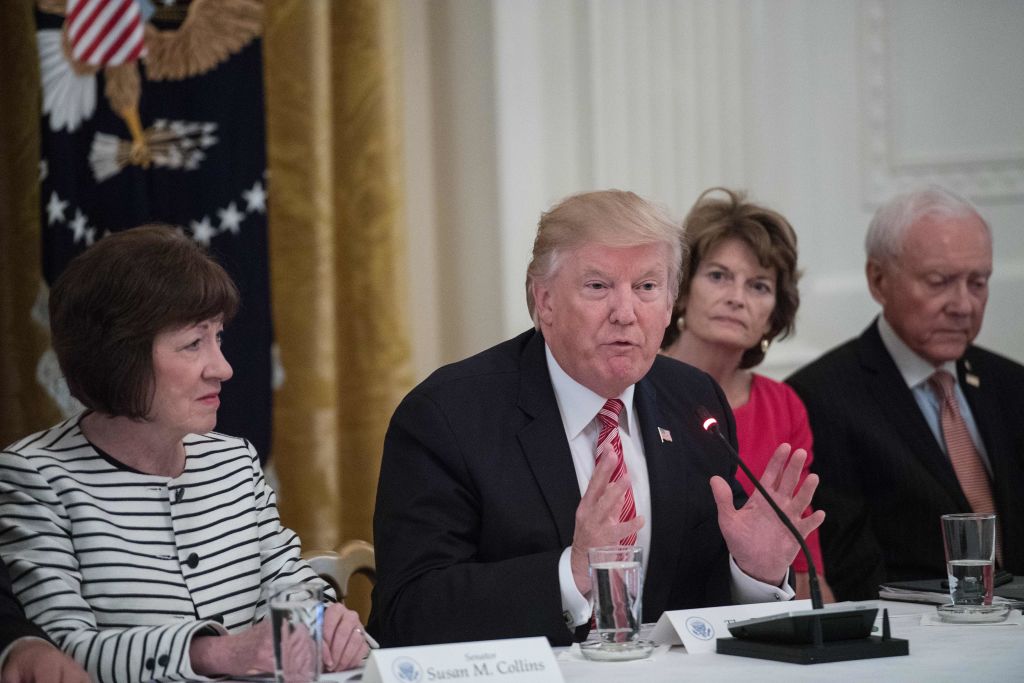Mitch McConnell is apparently trying to salvage his health-care bill with various 'side deals'


A free daily email with the biggest news stories of the day – and the best features from TheWeek.com
You are now subscribed
Your newsletter sign-up was successful
Senate Republican leaders have not given up on their health-care bill, after Majority Leader Mitch McConnell (R-Ky.) delayed a planned vote for this week until after the July 4 recess. McConnell and his lieutenants are trying to find changes that will bring at least 50 of the 52 Senate Republicans in line on the Better Care Reconciliation Act (BCRA), and one tool they are using is money. Monday's Congressional Budget Office score sent some Republicans running for cover, but it also gave McConnell $188 billion he could spend winning over members of his caucus.
Even before pulling the bill from an imminent floor vote, McConnell was considering channeling some of that pot of cash to health savings accounts, to win over conservative holdouts like Sens. Ted Cruz (Texas) and Mike Lee (Utah), Politico reports, while more moderate Republicans from states that expanded Medicaid under ObamaCare lobbied for shallower cuts to Medicaid and more money to fight opioid addiction. Tuesday was supposed to be "all about side deals," a Senate aide told Politico, though McConnell clearly did not reach such deals with enough senators as of Tuesday night.
McConnell's other move on Tuesday was to gather his entire GOP caucus at the White House, where President Trump listened to the concerns of GOP senators, sitting between two key holdouts, Sens. Susan Collins (Maine) and Lisa Murkowski (Alaska). Last week, senior political appointees at the Labor Department and Homeland Security Departments ordered staffers to write up a rule that would allow more H-2B temporary foreign work visas, "specifically mentioning innkeepers and fisheries in Maine and Alaska," Pro Publica reports, citing "three people with knowledge of the discussions." Collins and Murkowski have been pushing for more H-2B visas for their states for months, ahead of the peak summer season, to no avail.
The Week
Escape your echo chamber. Get the facts behind the news, plus analysis from multiple perspectives.

Sign up for The Week's Free Newsletters
From our morning news briefing to a weekly Good News Newsletter, get the best of The Week delivered directly to your inbox.
From our morning news briefing to a weekly Good News Newsletter, get the best of The Week delivered directly to your inbox.
No political officials directly tied the expedited visa rule to the BCRA, and a spokeswoman for Collins insisted, "There is no link — and there has been no attempt to link — this issue with the health-care bill." But staffers were concerned enough about the legal and ethical ramifications of tailoring the H-2B policy to fit two specific states that they pushed back. "It's not appropriate to pick and choose [which state or industry] should be winners and losers," said Laurie Flanagan at the H2-B Workforce Coalition. You can read more about foreign work visas and health-care politics at Pro Publica.
A free daily email with the biggest news stories of the day – and the best features from TheWeek.com
Peter has worked as a news and culture writer and editor at The Week since the site's launch in 2008. He covers politics, world affairs, religion and cultural currents. His journalism career began as a copy editor at a financial newswire and has included editorial positions at The New York Times Magazine, Facts on File, and Oregon State University.
-
 6 of the world’s most accessible destinations
6 of the world’s most accessible destinationsThe Week Recommends Experience all of Berlin, Singapore and Sydney
-
 How the FCC’s ‘equal time’ rule works
How the FCC’s ‘equal time’ rule worksIn the Spotlight The law is at the heart of the Colbert-CBS conflict
-
 What is the endgame in the DHS shutdown?
What is the endgame in the DHS shutdown?Today’s Big Question Democrats want to rein in ICE’s immigration crackdown
-
 TikTok secures deal to remain in US
TikTok secures deal to remain in USSpeed Read ByteDance will form a US version of the popular video-sharing platform
-
 Unemployment rate ticks up amid fall job losses
Unemployment rate ticks up amid fall job lossesSpeed Read Data released by the Commerce Department indicates ‘one of the weakest American labor markets in years’
-
 US mints final penny after 232-year run
US mints final penny after 232-year runSpeed Read Production of the one-cent coin has ended
-
 Warner Bros. explores sale amid Paramount bids
Warner Bros. explores sale amid Paramount bidsSpeed Read The media giant, home to HBO and DC Studios, has received interest from multiple buying parties
-
 Gold tops $4K per ounce, signaling financial unease
Gold tops $4K per ounce, signaling financial uneaseSpeed Read Investors are worried about President Donald Trump’s trade war
-
 Electronic Arts to go private in record $55B deal
Electronic Arts to go private in record $55B dealspeed read The video game giant is behind ‘The Sims’ and ‘Madden NFL’
-
 New York court tosses Trump's $500M fraud fine
New York court tosses Trump's $500M fraud fineSpeed Read A divided appeals court threw out a hefty penalty against President Trump for fraudulently inflating his wealth
-
 Trump said to seek government stake in Intel
Trump said to seek government stake in IntelSpeed Read The president and Intel CEO Lip-Bu Tan reportedly discussed the proposal at a recent meeting
